Cashing in on the rash of Sy Fy movies in the 1950s the dreaded production team of Al Zimbalist and Jack Rabin rented a studio for a week and produced from blank paper this celluloid story. The mob at the IMDB score it at 3.6. It is definitely below the Mendoza Line. (You either get it, or you don’t.)
The lobby poster says it all. But note that Marie Windsor gets top billing but that is not her on the lobby card below. Figure the out. On her more later.
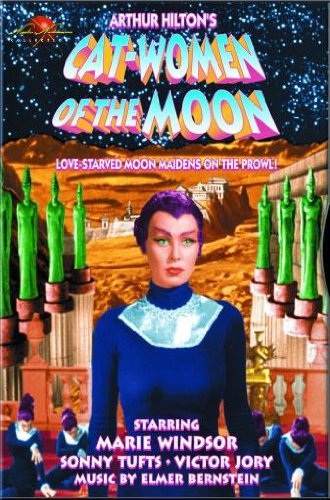
In the first manned, emphasis on ‘manned,’ space flight a crew of five sets off for the Moon. On the way it is struck by the de rigueur meteorites. How is it, in the vastness of space, every Earth ship is struck by 1950s meteors that is one the mysteries of the genre.
The crew is led by Sonny Tufts, and consists of Victor Jory, William Phipps, and Douglas Fowley, and Marie Windsor. The last four are reliable B picture regulars. Jory, perhaps for the only time in his fifty-year career, plays the romantic lead, sort of. An eternally young Phipps is the ingenue, and Fowley the greedy bastard that each crew must carry. Marie is the navigator and that is a refreshing change.
Knowing its reputation, when I started watching it, I was surprised to find I liked it at the outset.
Why? A woman has to be in the crew so that the man can fight over her, that is understood. In this case she is navigating rather than serving coffee. Excellent.
Moreover, in the opening scenes as the meteor damaged rocket approaches the Moon she is sassy and demanding. The men want to turn back without landing now that the rocket has a scratch on the paintwork. Not Marie. She came for the landing, not the ride, and she has her way with Sonny Tufts who then orders a landing. That is so different from the usual role for women in the genre.
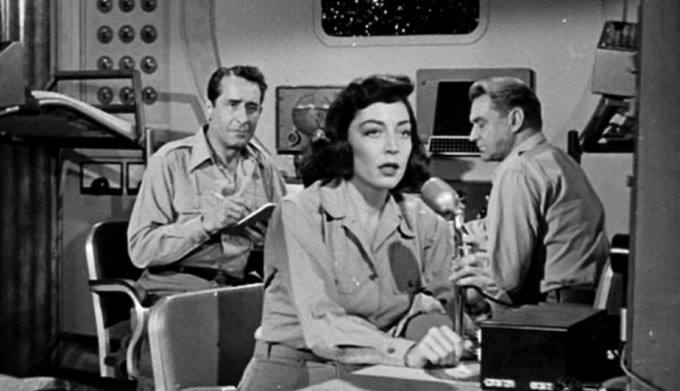
Marie Windsor takes charge, as Jory stares with incredulity, and Sonny looks for his flask.
There is mystery since she seems to know where to land, how to get there, and what to do next. She seems to be in charge while Sonny tries to remember his lines. Again so unusual, so excellent.
They don the spacesuits, rented from a novelty shop, and trudge in front of a matte painting of the moon done by one of the producer’s nephews, or so it seems. Along the way there is the only science in this science fiction film, and it is the science of Anti-Vaxxers. Even by the standards of the redoubtable Ed Wood, it is silly. No fifth grader would swallow it. Oh, wait, anti-Vaxxers would.
Some features of the Moon are demonstrated using cigarettes which the crew brings along on the flight and on the journey they make.
Journey? Once they land, Marie once again suborns Sonny into a walking tour to collect samples. Once again the men want to go home. Once again Marie prevails and Sonny gives the order.
See, she is in charge, though Sonny is the captain and Jory has a hard pistol at the ready.
A word on Sonny Tufts for those who don’t know him. He was a journeyman in Hollywood who got some lead roles in the 1940s when others were away on war service, then receded to this, and this, I am afraid, was not as low as he could go. In this picture, for those that pay attention, there are at least two occasions when all eyes turn to him for the next line and he stands mute. He forgot his line. Missed the cue. Was checking his hip flask. Or all the above. Fowley fills in for him once and Phipps the second time, as would happen in a stage play. More on old Sonney at the end.
The production is so cheap there were no re-takes. Indeed, so cheap that the end was truncated when they were told to vacate the studio and so some sources say six-pages of script were skipped, and they blast off.
Marie Windsor was the frail and sometimes the femme fatale in a number of excellent B noirs, like these crackling films: ‘The Killing’ (1956), ‘The Narrow Margin’ (1952), and ‘Hellfire’ (1949). She often played women of whom her Mormon relatives in Utah would not approve. She did everything on television, including ‘Murder, She Wrote.’ A real trouper. Ditto Jory, Phipps, and Fowley.
On the Moon she leads the party into a cave that has an atmosphere and Earth gravity, such is their science. They doff the rented spacesuits which had to be returned for the deposit and encounter the inhabitants.
In a creature feature a creature is necessary and they encounter several large rubber spiders like the one the fraternity brothers put into each others clothing. Yuk.
While quick draw Jory blasts away at these creatures, they are observed by shadows with up-do hair buns. Yes, these are the cat women. And about time.
These Earthlings are scientists, the first on the Moon, who show no interest whatever in anything they find. Despite Marie’s urging, they collect no samples, but once the spacesuits are off, they light up those fags. For her part, she plunges on ahead, annoying the men who still want to go home.
Though it is only sixty-four minutes long, it seems longer, and they eventually met the cat women who are described in the credits as the Hollywood Cover Girls, eight in number, in black leotards. These are the only survivors of a once thriving race in the Moon caves, with the spiders. No cats are present. No cats are mentioned. No cats are shown. There are no cats. But then the Hollywood Cover Girls had no existence outside this movie either.
Here is the back story of the Moon. The women grew to dominate the society and the men died out. Without the men there were no more women. So far, so biology.
This is what happens when women get bossy. They take over. The poor hapless men lose their manly vigour and MPG – Minus Population Growth.
In fact, this tale has been acted out on the flight to the Moon, where Marie bosses them around and then leads the men into this trap. Their vigour, however, remains in tact.
Trap? Yes, trap. The cat women want that ship to travel to Earth and boss the men around there, too! First an inch, then 250,000 miles.
And this nefarious plot explains everything. They used their telepathic powers to identify Marie years ago, and to impart to her knowledge of solar navigation. How else could a woman find the Moon? The cat women had learned all this from their last men before they went emeritus. With this knowledge Marie became the navigator. As the ship approached they telepath-messaged her again and she then landed the ship on the spot, and led the ground party to the cave, and while the crew was having a smoko, the cat women swiped the rented spacesuits and returned them to the novelty shop, thus capturing the crew for their purposes. Note, the women get all the knowledge from men and past it on.
Maire is but a puppet controlled by mental telepathy. Jory has been irritated all along what with Sonny missing his cues, and Marie ignoring his charming smallpox scars, so he brandishes his six-gun now and then, disrupting the catty plan. At one moment, he grabs Marie for some within-code manhandling, and in the clinch the telepathic hold on her is broken by his manly grip and smell, and she blurts out the secret femme fatale plan!
Jory likes that and continues the manhandling so that Marie will tell the others. Sonny gets confused and forgets the name of Fowley who has wondered off to get killed. Remember the spiders? No one seems to miss him.
Phipps has found true love among the cat women and his squeeze confirms Marie’s warning. Gadzooks, as we say on Tuesdays.
Then Jory starts shooting. End of cat women, including Phipps’s true love. Maire, Jory, and Phipps skedaddle for the rocket ship. Sonny stayed in the bar. THE END.
Technical notes. While the space ship has a lot of dials and levers, it also has a lawn lounging chair where Tufts lies recumbent much of the time.
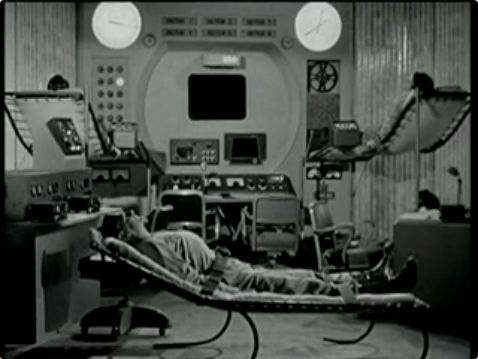
Sonny strapped into his lounger from whence he commands.
Indeed, throughout the picture a lot of people are shown sleeping, not all of them are in the audience but many must have been. Maybe these were candid shots because the cast found the whole thing a bore. The cat women dance…. for themselves. Their guests are…sleeping. Once the guests are gone, the cat women can no longer resist the impulse to put those leotards to good use.
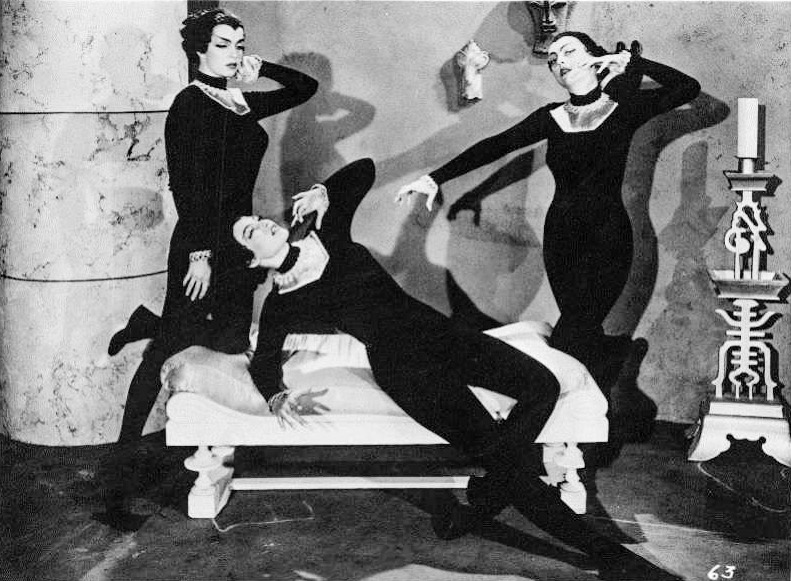
They dance for a while. Looks like a 1950s Beatnik number.
I made light of finding the Moon above, but in ‘Rocketship X-M’ (1950) the crew missed the Moon and hit Mars by mistake. Maybe solar navigation is harder than it looks from the ground.
Sonny Tufts was a high diver. The scion of a Boston banking family, he made the Back Bay mistake of graduating from Yale University and pursued a career as an opera singer in New York City, until it was discovered he could not sing. He was forty-one when Cat-Women was made and looks more than ten years older and the paunch is clearly visible in standing profiles. That is why actors befriend cameramen, to avoid such shots. He was big and lettered in football among the Elis, playing against the Crimson. This was a sin never forgiven in Boston. By the time this film was cast, his name was a joke in show business. He had fallen head over heels in love with alcohol. His wife frequently had him jailed. Several women sicced the police on him for his unwanted attentions. He was to be found wondering the streets in the wee hours looking for another bar. He is parodied in Humphrey Bogart’s ‘In a Lonely Place’ (1950) as the drunken and permanently between engagements thespian next door. ‘Cat-Women of the Moon’ may have been the highpoint of his career.
‘The Maze’ (1953)
Everyman Richard Carlson leads a handsome cast in this Gothic thriller made for the Fright Night drive-in market.
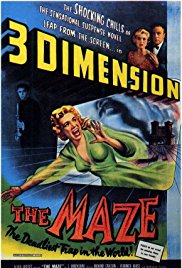
Carlson is dancing the night away to celebrate engagement to Beauty, when he receives a telegram. The news is bad but not that bad. His Scots uncle has died and he is the new baron, required to go to the distant, remote, and forbidding castle…in studio 13 of Roach Pictures. Few who go there, return…to A pictures.
Richard takes leave from his fiancée with many endearments and promises a speedy return after completing the formalities.
Guess what happens next?
The movie opened with a cryptic conversation between Australian Michael Pate and another retainer in the dank, dark castle when his Lairdship cacked it. An air of menace hangs over them. Carlson’s inheritance seems tainted even before new reaches him.
Some days later Beauty gets a letter from Carlson blowing her off, for good, for ever. for good-bye.
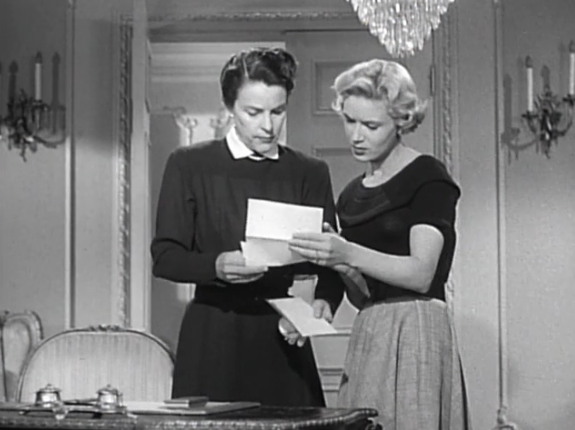
She and her aunt study the letter for its subtleties.
It is a ‘Dear Joan’ letter to end ‘Dean Joan’ letters. It stings but she is one bracing woman and with her aunt in tow sets out to Studio 13, that is, Scotland, to straighten out Richard. Could not quite see why she was so determined to land him, but she is.
It takes some will power to get there, first the Atlantic, and then across the moors (of course), and even more to get into the door of the castle. Michael Pate is one polite but reluctant doorman. Once admitted she meets again her beloved and finds him a changed man.
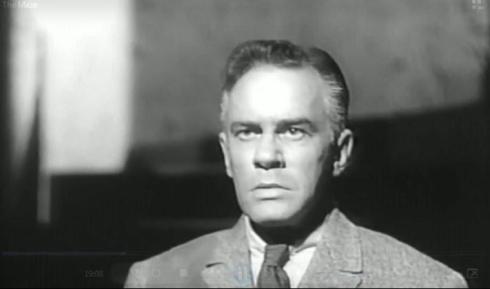
Once young, now old. Once affable, now grim. Once in dinner suits, now in tweeds and argyle socks. Changed. (The fraternity brothers were betting on a kilt.)
Yes, about a pound of make-up has been pasted onto him along with much grey hair spray to age him and make him look haggard, like a man with a credit card debit he cannot pay and a pile of unmarked examination papers waiting for him.
This shock redoubles her determination to get to the bottom of this mess. A sensible woman, her aunt wants to go home. So did I by then. Various hijinks and confrontations follow. To continue the narrative I have to spoil the denouement and I want to, because it is so Abbott and Costello. To ask an audience to suspend disbelief is one thing, this is another.
As Richard explains in the wrap-up at the end, when he arrived at the castle he discovered that his great grandfather was a frog. That was bad. Worse was that frog great gramps still lived, because some frogs are long lived. The slithering in the hallways at night, the midnight splashing in the pond at the middle of eponymous maze, Carlson’s make-up, these all trace back to great gramps, who still runs the place, frog though he be. The succession of Barons, Carlson being the latest, have been fronts for great gramps, tenderly cared for by Michael Pate and his Igor, who runs the show as Frog in Charge. Everyone addresses this frog as ‘Sir.’ Sure. I kept thinking of Elmo.
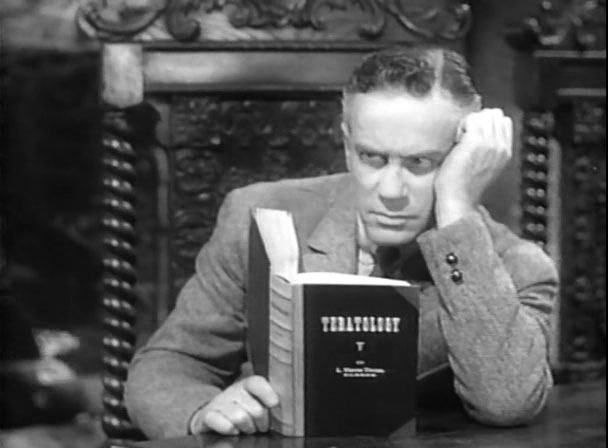
Carlson reading up on teratology in the amphibian section.
The Castle of Otranto atmosphere is thick and entertaining. There are lots of cobwebs. The mystery of Carlson’s transformation is intriguing. The confrontation in the maze is creepy. The players are fine, and the pace is measured. Pate is so ominous no denouement could live up to the foreboding he inspires.
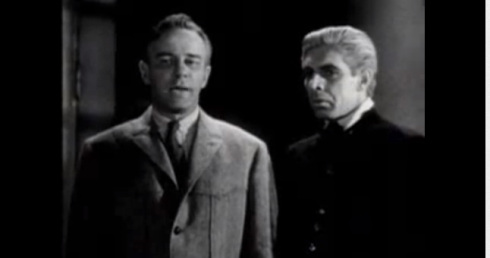
Carlson and Pate trying to look the parts.
In short, the set up and the build up are good, but the result in Act III is a fizzle. Like those storms that crack and whirl and then dissipate with a drop or two of rain. The screenplay had no finish. ‘The Creature from the Black Lagoon’ (1954) or ‘The Fly’ (1958) made more sense.
How uncle combined the mind of laird and the body of a frog is Ed Wood science. Moreover, with that family tree, why would Beauty want to marry Carlson? Newts, efts, and toads to come are there? Or did she trust that her kiss would transform?
The novelty of 3D at the time was such that even this schlock-fest was given the treatment. But 3D never worked in drive-ins anyway.
‘Salamander’ (1994) by J. Robert Janes
The Salamander is an arsonist in Occupied Lyons in 1943. A fire in a cinema immolated nearly two hundred patrons on a freezing winter’s night.
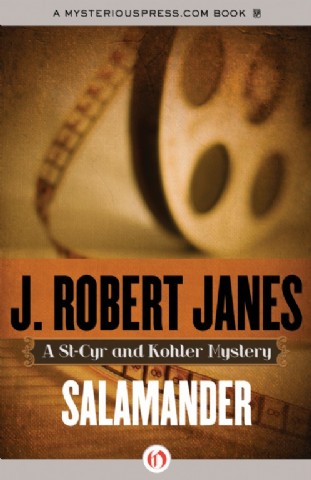
Screening was ‘La Bête Humaine’ (1938) from the novel by Émile Zola and realised by Jean Renoir. Many of the victims of the fire were railway workers and their families.
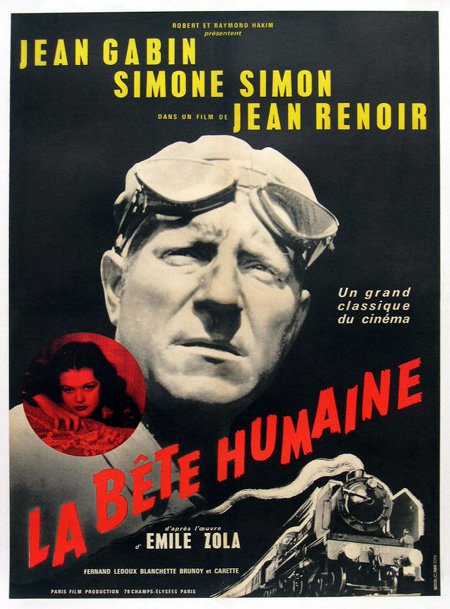
The central characters in the celluloid story were railway workers led by the peerless Jean Gabin before his face was scarred by German shrapnel in 1943 in North Africa. Many rail lines converge on Lyons, giving it a large resident population of the chemin de fer.
The freezing weather, absence of materials and expertise, and infighting among the responsibles in the civic administration combine to preclude any forensic investigation. There is a very great deal of duck and cover. Then by chance a German fire chief just happens to show up and throws his weight around, seemingly determined in all but word to misdirect and confuse. Yet he must be there for a reason.
The Nazi commandant is one Klaus Barbie, young, educated, debonair, sophisticated, handsome, bilingual, and blood thirsty, a soft-spoken vampire.
 Called the Butcher of Lyons for good reason.
Called the Butcher of Lyons for good reason.
Was the fire an act of the Résistance that somehow went wrong, or internecine conflict among factions of the Résistance? Either is possible. Was it Klaus Barbie’s way of attacking the Résistance? This is certainly within the bounds of possibility. And if he did, he might prefer not to publicise it, just to trade on the doubt. Or is a murderous arsonist at large threatening one and all?
A large gathering of hundreds of nasty Nazis is scheduled for Lyons very soon, and to allow for the histrionics of their conclave it will be convened in a huge, old opera house full of dry timber, a catacomb of rooms, with a maze of gantries and catwalks that have never been mapped, side entrances, underground loading docks, concealed exits for divas to elude adoring fans, and other mysteries. In short, an arsonist’s delight and a nightmare to police.
Barbie will not delay the meeting of the coven. To do so would damage his prestige and be an admission that he cannot control Lyons. Uh huh. Is that because the first fire was his and he feels safe, or is it just arrogance? Not even his superiors in Paris are sure and so they send St Cyr and Kohler in case there is a firebug at work. Of course, if a Nazi barbecue occurred the retaliation is unthinkable and that knowledge motivates St Cyr and Kohler to superhuman efforts, and writer Janes spares them nothing.
Kohler is a good German but not a good Nazi. St Cyr is a good cop and patriot, but crime is crime.
There are the usual plot twists. In this outing St Cyr seems unstable, accusing nearly everyone he mets of the crimes. Kohler, for once, has cut back on benzedrine and is calm by comparison, though he is caught with pants down and survives.
There is a great deal of description that goes beyond setting the scene. This is an early entry in the series and the writing is uneven. But the portrayal of Barbie is ambitious and measured. Mad and bad, yes, but controlled and calculating, too, and well aware of the fact that his own superiors could cut his throat at anytime for reasons of their own. As always the stifling and exhausting atmosphere of the Occupation is the principal character.
But the greatest fault is the presentation on the Kindle. The text is continuous even when it cuts back and for the between Kohler and St Cyr. Kohler is in one part of the city creeping through cellars looking for phosphorous and St Cyr is at a hotel checking on guests and luggage. When the scene changes from one paragraph to another there is no signpost of any kind, no blank line, no asterisk, no signal in the text. Ergo I was taxed to re-read many paragraphs when I realised it had switched from one to another. The publisher bears responsibility for this needless levy on my time and patience. Tsk, tsk, and tsk.
When reading Marc Bloch’s memoir ‘Strange Defeat’ (1940) for the first time years ago, I had a conversation with a very intelligent philosopher who found my curiosity about Occupied France odd. His line was that the defeat in 1940 was the cleansing failure of a corrupt capitalist regime. And after all, as Bloch notes, life went on the day after pretty much as always, hence Bloch’s title. I did protest to this intellect that changes came, but these, I was told, I had got our of proportion. Ah but I continued to protest, Bloch himself joined the Résistance and was captured, tortured, and killed by the Nazis. This fact was a mere bagatelle to my interlocutor. Bloch brought it on himself that was his line. Really nothing had changed from one day to the next with the change of the flag. That philosopher ascended to the professorship confident in his judgement. All very like those academic apologists for Pol Pot, Mao, and all the other mass murders.
St Cyr and Kohler know what this great intellect did not, does not, know, reality comes through the skin.
Museum of Australian Democracy at Eureka
While sojourning through the historic gold fields of Central Victoria we visited M.A.D.E. in Ballarat. It is located on the site of the Eureka Stockade of 1854, and in part recounts that story for those who missed the Chips Rafferty film. It is named on the premiss that the Stockade founded Australian democracy.
The museum is purpose built and very well designed and attractive. We particularly liked the symbolic rendering of the Stockade outside. Inside it is circular and so draws along the visitor, while mimicking the circular stockade outside. The centrepiece is the tattered remains of the homemade Eureka flag, which is surprisingly large.
 The curator at work shows the size of the flag.
The curator at work shows the size of the flag.
Ought not that to be the national flag? (And ‘Waltzing Matilda’ the national anthem; the 1977 plebiscite be damned?) Around the museum are artefacts from the days when Australian political practices developed and more general displays about the nature, value, and exercise of democracy, or so it is alleged.
But, and it is a large ‘but’ I found it as confused about what ‘democracy’ means as the rival museum in Old Parliament House in Canberra, though I thought MADE had more intellectual content and was less puerile that the Canberra version. There are comments on this latter museum elsewhere on the blog for those looking for trouble.

By the way, I typed it as MADE and not M.A.D.E. because I cannot fathom the point of the periods after the capital letters that stand for single word in an acronym. After all NASA and NATO have gotten by all these years without four additional and superfluous periods, as did the USSR. Yes, pedant that I am I did look in style guides for an explanation of that accoutrement and found none.
What the museum seems to be about is liberalism, that the individual is an autonomous being and that social and hence political arrangements should recognise and respect that. This liberty of the person is based on the capacity for autonomy and in turn that justified endowing the individual with the political rights to express and defend that autonomy. Rather than leaving individuals to defend those rights in a combative state of nature, political institutions develop to protect them in an orderly and predictable manner making social life peaceful. The foregoing is a gross gloss on Immanuel Kant who best explains this concept of autonomy with some seasoning from Thomas Hobbes.
The point to bear in mind is that persons may have social, economic, and moral liberty without political rights. A benevolent government, say a monarchy, may permit this, and in fact that is the evolution of political rights in England. But that evolution was contingent not necessary.
The Goldfields Diggers were, moreover, good John Lockean liberals and mixed their labour with the soil to create property. That term ‘digger’ took on another meaning in the trench warfare of World War I.
MADE makes no mention of Kant or Locke, but implicitly that concept of autonomy best unifies its exhibits. Some of this concept is masked by a smokescreen of jingoism according to which what is on display is Australian democracy, not democracy, but AUSTRALIAN democracy. Is it like invoking Singapore democracy when harassing journalists? Is that like dropping an apple and explaining it as the work of AUSTRALIAN gravity?
In contrast, there is little or nothing about the practice of democracy and the institutions, formal and informal, that embody it, still less any critical perspective on any aspect of it. The extension of the franchise gets a mention, but not systematically enough for this pedant. The property, racial, and gender discriminations that limited the franchise for generations was also Australian but it is passed largely in silence. Slavery in the Queensland cane sugar fields that compromised Federation from day one is likewise omitted. Indeed Australian history books coyly even now do not use the word ‘slavery’ for this quaint far north Queensland practice but maybe this is a tangent.
The evolution of the secret ballot seemed to be absent, yet as a school boy on the distant Platte I learned that the secret ballot was the (South) Australian ballot. A little jingoism on this point might be in order, or is that out of bounds because MADE is about VICTORIAN democracy? Once begun parochialism does not easily end.
Still less was there anything about the peculiarities of the hybrid Australia assembled by shopping in both Westminster and Washington for institutions. Nor is there anything about the oddities of the methods of voting and vote counting that run through Australian politics, from that Hare-Clarke system in Tasmania where everything must always be different to the endless rumours that the thirty-eighth preferences were not counted on upper house ballots in New South Wales. Some suppose this obsession with convoluted voting systems reflects a low level of social trust, which hardly fits the triumphal message of the Museum. Alan Davies used to say that.
Nor is the strange case of Queensland, speaking of differences, mentioned which has gotten by without an upper house for all these years and, despite the implications in MADE, has not been noticeably more democratic than the other states for the absence of the check on the democratic lower house.
Then there is the oddest thing of all: compulsory voting, which was legislated in 1924 as a convenience for political parties and is now a sacred totem seldom discussed rationally. When combined with the preferential ballot it produces strange results yet it is worshipped as OURS.
To many intellectuals the very word ‘liberalism’ is anathema and to the popular mind it is often associated with the political party of that name. As to the latter, set that aside. After all one can talk about labor without invoking that party, so surely one can talk about liberty without limiting it to Liberals. They do not own liberalism any more than the ALP owns the concept of labour.
As to intellectuals the story inevitably is longer though simple. The short version is the liberal-democracy has been regarded as the root of all evil for two generations. That mantra has made many a career, Think Noam Chomsky and all the little wanna-be little Noams out there, often citing incomprehensible French and German thinkers to clothe the nostrums they spout. Against that bulldozer of opinion it is a brave scholar who proclaims allegiance to liberalism. This ground has been trod in previous posts, the most extensive being on a CBC program; I forebear from repeating here not out of consideration for the bleader, but because it is too depressing to recount.
Suffice it to say that during the Cold War, complacent and secure intellectuals made it a career to attack and undermine their own society, and they did such a good job that their spawn now is the President of the Electoral College, the Twit in Chief.
Getting back to MADE, there is intellectual content. The analysis of the speeches on audio and video was very fine and well worth doing, though neither that analytic content nor the speeches themselves were integrated into the meaning of democracy. Yes, speeches can be influential. Adolf Hitler knew that, and by the way he participated in and won elections without the bedrock of liberalism. Likewise the video parade of books was well done but was not integrated into the theme of the Museum. What Thomas More’s ‘Utopia’ has to do with AUSTRALIAN democracy is anyone’s guess.
Outside is a symbolic replica of the Stockade and that is imaginative, informative, and interesting. It is located on the original site, and it gives some idea of the scale of events. Well, I assume the scale is relevant. It is small though inside the rhetoric is large.
As homework for this visit, I read Clare Wright’s ‘The Forgotten [Women] Rebels of Eureka’ (2014).

I got a lot of the context of the Victorian Gold Rush from it, which was all new to me, despite the agony of reading all six volumes of Manning Clark’s vastly overrated ‘History of Australia.’ (That Clark hatred Australia was very apparent to this reader and also that he resented the fact that he lived here.) The explosion of the population and the attendant confusion was food for thought. The population of the colony of Victoria doubled in weeks, and then doubled again, and again. The flood of gold-fevered immigrants was so great that a FULL sign went up and they were turned away from Port Phillip in Melbourne. To circumvent that prohibition passenger ships landed many in South Australia who then walked a thousand kilometres to Victoria.
Most of these feverish get-rich-quickers were young men. Half the population was under twenty-five, burning with the brassy impatience and dangerous inexperience of youth. Thousands and thousands were Chinese and this influx was one catalyst for the later White Australia policy which was born in Victoria. Many Chinese had been displaced by the aggressive British Opium Wars in southern China. (For the fraternity brothers who cut the class, the British fought the Opium Wars [plural] to force the Chinese to accept in trade British opium from Afghanistan. From this chapter of history was born the mythical Chinese Opium Den [British owned].)
The vagabonds, freebooters, refugees, gold diggers, and others who flocked to Victoria were polyglot. Some were late Forty-Niners from California, including some riff-raff thrown out of San Francisco. (Imagine what it took to get thrown out of San Francisco at that time.) French escaping the turmoil of 1848, as well as Hungarians, Jews, Croats, Italians, Venetians (who then, as now, do not regard themselves as Italians), Irish, Rutherainians, Ottomanis, and the like found passage to Victoria. Those who missed California in 1849 were not going to miss out again!
It is some indication of scale of the gold rush that these centuries later that two of Australia’s largest and most substantial inland cities were built from scratch at the time and remain, Ballarat and Bendigo. Each still evinces the wealth that abounded in their past in the scale of their streets, the monumental public architecture, the grand houses, and the art in galleries.
This human assortment at Eureka had nothing in common but gold lust. They were not Englishmen out to (re-)claim the traditional rights of Englishmen as were the American revolutionaries. They were not Europeans bent on toppling the privileged and exploitative ancien régime, though MADE draws a straight line from these uprisings to Eureka, leaving aside the pogroms the accompanied many of them. They were not intellectuals inspired by Thomas Paine’s ‘The Right of Man.’ They were greedy individualists. Period. Sorry, Chips, but it is the obvious truth. None of them was there to make a better world, serve humanity, cure cancer, or anything else, but to feather their own nests. They wanted secure property rights for individuals, not majority rule.
Here is an irony. If this human soup was the origin of Australian democracy, the practice of democracy in Australian for the subsequent century and half was partly dedicated to straining that soup. It had started earlier with the near extermination of the aboriginal population. White Australia kept out the Asians. The oppression of the Catholics kept the Irish and later Italians in their place well below stairs. The reluctant acceptance of Post World War II refugees, known as refos, from Europe was only slightly preferable to Australian democrats than the Yellow Peril from the north.
The point is that Australia was no better. albeit no worse, than other European societies.
‘Killer Klowns from Space’ (1988)
Who could resist such a title? Not me.

On the IMDB it is described as a comedy. I hoped it would equal, nothing could surpass, ‘Spaced Invaders’ (reviewed elsewhere on this blog). Not so. At first I thought it was a documentary about the Republican Party. Mea culpa.
The set-up is priceless and the execution is consistent, but it is not comedy as we know it. The genre would have to be Horror, sub-species ‘coulrophobia.’ Look it up, Mortimer and be enlightened, for once.
A circus tent complete with an ensemble of grotesque clowns, oops, klowns, lands in Royal Dano’s (who else!) pasture outside Hicksville USA. The Klowns set about harvesting climate change deniers, wrapping them in cotton candy to ferment, and when just right…..
When interrupted by teenagers doing extracurricular biology lessons, the alien klowns call out the dogs. That was a cackle and a half.
There is a phylum of Horror movies where teens discover the evil and try to report it to authorities, who stupidly reject the reports until it is too late. ‘The Blob’ (1958) was the landmark in this category, though not the first and certainly not the last. In this instance authority is played brilliantly by Sheriff John Vernon, and we waited for his comeuppance which came on cue.
 Comeuppance delivered.
Comeuppance delivered.
We also like the shadow play on the wall, and then wooshka!
There is an ice cream truck, lots of red noses, and a Willy Wonka interior of the Tardis space tent.
There is one scene of tension with a little girl and a wooden mallet.
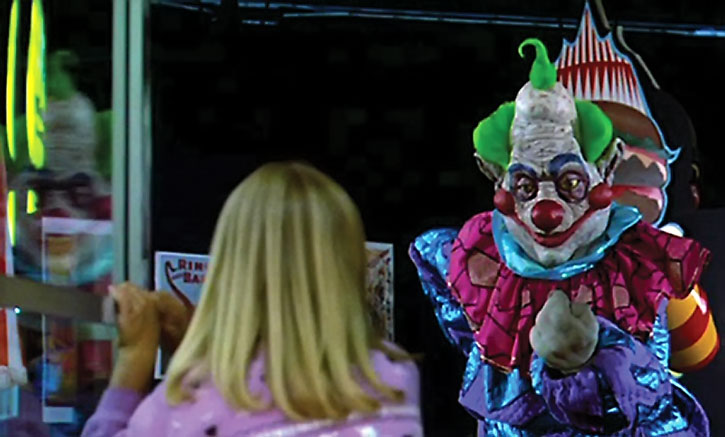
And a long, boring, and pointless scene in a pharmacy.
The Klowns are frustrated by the teens and blast off in their tent spaceship before hundreds of eye witnesses who use alternative facts to explain the destruction left behind. These are people are known as the Klown deniers. But more importantly, what did happen to Royal, his dog, and the others? Who knows. What were the Klowns doing? We’ll never know, until we watch the sequel.
IMDB has it at 6.1, which way to high to me, though I admired the artistry in the effects when it was clear the budget was … well, what budget? The cast, apart from Mr Dano, were unknown to me as no doubt I am to them.
‘Beyond the Time Barrier’ (1960)
A much better movie than its paltry IMDB rating of 5.3 indicates. What I liked was the message that we are destroying ourselves. Who needs aliens when we are so good at it. I also liked the integrated set design and the ambiguous ending. Altogether it is more thoughtful and well realised than the score which puts it a mere 0.2 points ahead of the turgid and indigestible lump that is the big budget ‘Saturn 3’ (1980) at 5.1 with its all star cast.
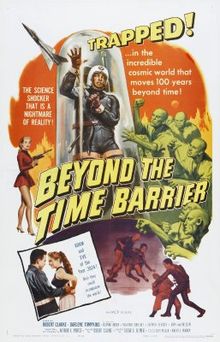
Lobby card.
Chuck Yeager had the day off and in 1960 test pilot Robert Clarke (remember him from ‘The Hideous Sun Demon’ [1959], probably not under all that make-up of sun skin cancers) flies his X-Plane into the year 2024. High octane, indeed! Whoops!
He seems to land back at the airbase he left, unaware of the elapsed time and finds it an abandoned ruin. Empty. Spooky. Eerie. Nice. There is no one and nothing among the ruins. Not even a calendar. Little does he realise he is beyond the Time Barrier! (Most airlines charge extra for that.)
He heads toward a distant light, wearing his flight suit and helmet. He does that a lot. Not the most comfortable of gear, but it does make him stand out.
He stumbles on to an underground civilisation where, after assaulting the first natives he meets, as per his survival training, he is perceived to be an enemy, a spy, a threat. Dunno why. I suppose the flight gear partly explains that reaction but it is not made explicit. He is imprisoned and in time finds there are three other prisoners, Russians who, thanks to the miracle of Hollywood, speak perfect English. Russians. 1960. Oh oh.
There follows much Geordie-speak about the time barrier. Oh hum. When they show him the current Dilbert desk calendar Clarke finally gets it: 2024. (He goes all able when he thinks of how many IRS returns he has missed!) While these four realise they are time travellers, the Mole people do not believe such a thing is possible and deny reality. Now who does that remind me of….
The four scapes decide to use Clarke’s plane to go back in time to warn humanity of the plague and so prevent its occurrence. ‘Scapes’ are those who escaped the plague. (What a struggle to quell automatic correction to ‘scares.’)
Plague? Yes, as one of the Moles explains to Clarke, the accumulated pollution of earlier times had depleted the ozone layer and harmful radiation bombarded the Earth in 1994 creating a plague. There were three results: most people died, others mutated into beasts called GOP, and a few fled underground but are now sterile moles.
To review, class, the dead are gone. Forget ’em.
The mutant beasts roam around the surface making it unsafe for the Moles, though Clarke encountered no beasts on his wanderings thanks to the low budget for wandering beasts. When we see some of these beasts in The Pit where Clarke is briefly incarcerated they are straight out of a Weimar expressionist horror movies like ‘Nosferatu’ (1922), white as Dracula, bulbous shaved heads, and slavering creatures. Yuck. They are certainly Republicans. We never see any of their brethren or sistren in the out of doors, nor is there ever any explanation of why these several have been imprisoned in The Pit except as a forthcoming plot device.
The Moles are a classy lot with swanky gear and funky art deco furniture but their kind is dying from sterility caused by the plague. Only Eve is not sterile and from the get-go she fancies Clarke as her Adam. Must be the sexy flight pressure suit codpiece. Ahem. He is slow on the uptake and who can blame him since Eve says not a word, giving him the silent treatment. She is a deaf mute but the Mole scientists are sure she is not sterile. And ready for …. Uh huh, but how do they know that?
She communicates by sign language. ‘One is for….’ She is also a telepath who reads minds and finds that Clarke is harmless and protects him with vigorous sign language like a third base coach on speed.

Triangle on the wall, who is the fairest empath of all?
A silent role is not a good foundation for a Hollywood career and she has few other credits and some are hard to forgive, like ‘The Dukes of Hazard.’
There is also one reference to other survivors but that is left a loose end for those of us who were paying attention.
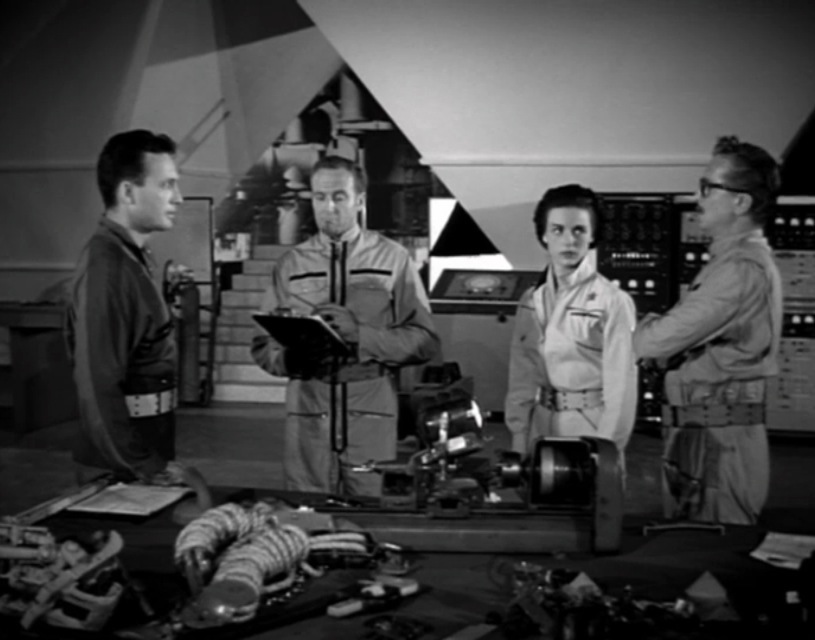
Clarke and the Russians hatch a plan. However, well, it is 1960 and the Russians are not to be trusted now are they.
Still, Clarke, a changed man, is intrepid and makes it back to 1960 to warn the climate change deniers, the anti-vaxxers, and the Tweet-in-Chief of the coming plague. Yeah, right, that’ll do a lot of good.
Edgar Ulmer (he of ‘The Man from Planet X‘ reviewed elsewhere on this blog) was the director and once again he showed Roger Corman how to do a lot with a little.
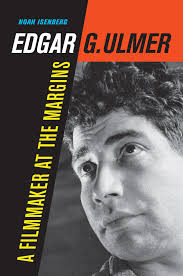
It was filmed in five days funded from the tip jar. The set design of triangles is brilliant and consistently carried through in the camera dissolves and fades.
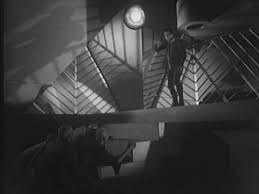
There are also automatic doors, and sometimes the triangles are askew, giving the effect of a world gone Escher.
Some of the comments among the self-appointed reviewers are a cackle. One shouts ‘time travel does not work like that!’ Evidently there are daughters among us those who know how time travel works. Keep that in mind.
‘They Came from Beyond Space’ (1967)
A late entry in British 1950s science fiction on a par with Gerry Anderson productions. (Mortimer, you either get or you don’t.)
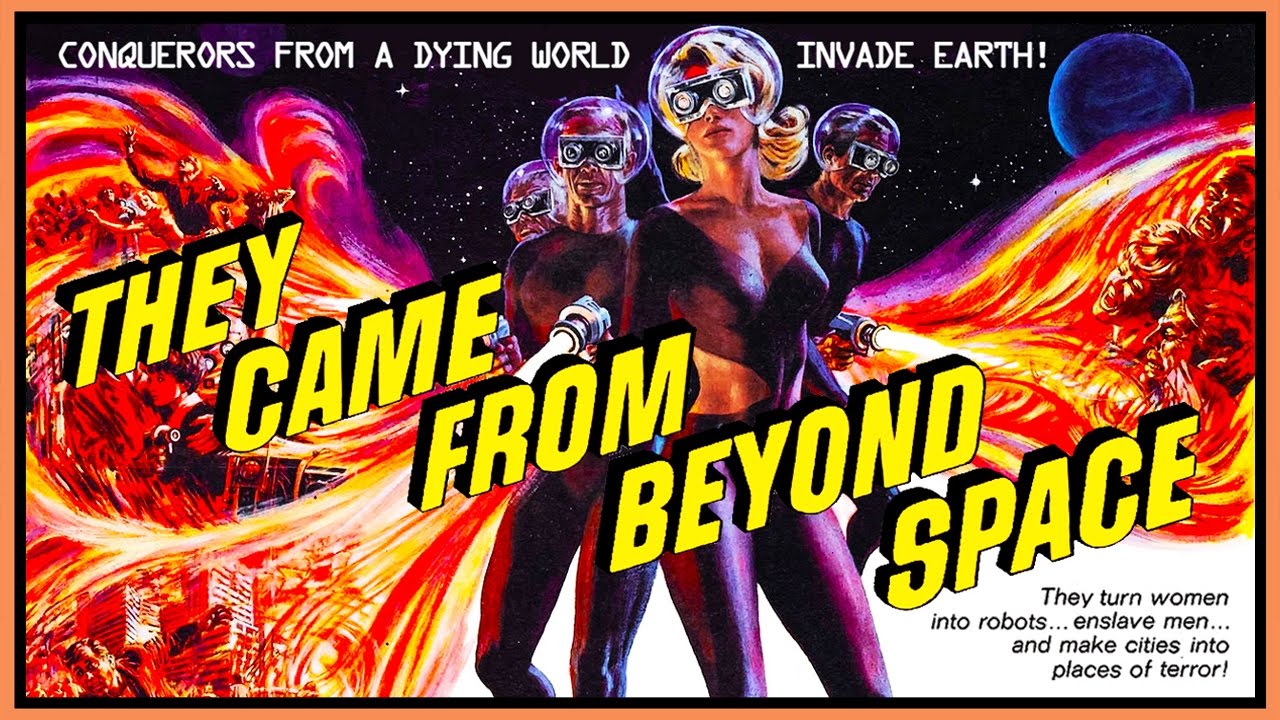
A misleading lobby card.
Meteors land all in a row in a Sussex field and bright lights take over the minds of the scientists sent to investigate. Only the Top Scientist is immune, because he is numbskull.
Spoiler! The Anti-Vaxxers are right! Colanders with tin foil do offer protection.
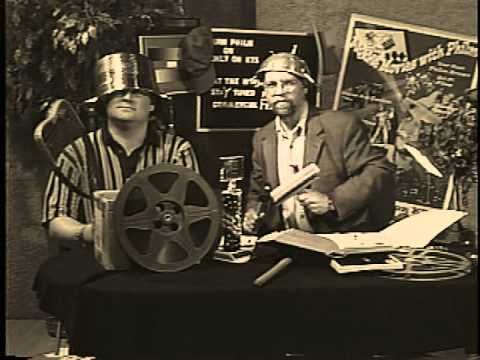
These guys are ready for ‘They Came from Beyond Space.’
The Top Scientist finds that his squeeze now rejects him. She must be possessed by an alien. What other explanation could there be, Erich?
Top is multi-skilled in marksmanship, judo, lock picking, all skills the essential for a PhD in astrophysics. He can also talk opponents to death in the best seminar manner. He is a boring James Bond with a nary a twinkle. He, unlike Bond, is not in on the joke.
He has resisted the mind control of the alien meteors because of the tin plate in his head, the result of too much McKinsey speak at the university with the research manager so off to the kitchen for colanders. Thus equipped he and his elite unit tackle the aliens’ HQ on the Moon.

The Moonies hangout.
The Moonies have been alien-napping hordes of rustics, who are never missed, to toil at a Big Dig on the Moon. Top and team liberate them and then they — the freed rustics — spontaneously overthrow the Moonies in their lair.
As if.
Once under the tin hats, the rustic toilers would probably turn on their liberators and blame them for not getting there sooner, for letting them be alien-napped in the first place, file for compensation, whine about Toto, argue with each other about whose feelings were hurt the most, reject the tin hats as not eco-friendly or stylish, go on strike for better conditions before rebelling, and so on.
Why fight enemies when fighting friends is so much easier.
At the denouement the Master of the Moon, Michael Gough in a Carnaby Street robe, explains his innocent motives to Top who then graciously agrees to help. Huh? All the fisticuffs, shoot ‘em up, slavery, and mayhem, and yet they shake on the deal.
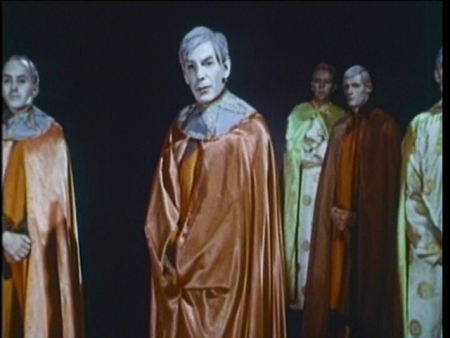
‘Groovy robe, man.’
Did Bond make a sweetheart deal with Dr No? No way!
Can anyone come from Beyond Space anyway? That threw me. Beyond Space, where is that? The Moon? New Jersey?
Much of earlier science fiction used the threat of aliens directly or indirectly as a metaphor for the Cold War, communism, and brain-washing as illustrated here. Hence the proliferation of colanders in the 1950s in Middle America. On the whole the production is lifeless. I did not care if the hot rocks zapped them all. No loss.
It is a common motif in sci-fi that the aliens are vastly superior to us primitive Earthlings, yet somehow the puny Earthlings overcome the aliens. Because of their superiority the aliens are able to come to Earth while weak humans remain planet-bound. The aliens’ superiority is usually shown in technology, but mental powers are also invoked, and in some cases there is moral superiority – think of those that are Greener-than-thou (and everyone else).
Yet somehow the runts of the galactic litter that is humanity overcome these leaders of the pack. Often doing so involves judo. Using the strength of the aliens against them. In Captain Kirk’s case it all too often involved talking them to death.
It is also a common motif that the aliens have come to Earth for real estate because they have mucked up their home world by listening to the climate-change deniers. In other cases they come for other resources, including US!
‘Rocketship X-M’ (1950)
A crew of five sets off for the Moon but takes a wrong turn and hits Mars instead. So much for fancy integrated Solar Positioning System of navigation in the new rocket. The film combines very little technology with some striking photography, and the slow and fast death of one and all, and a message. In ground control is that eternal Sy Fyian Morris Ankrum who tries to make it upbeat in the end. He fails.
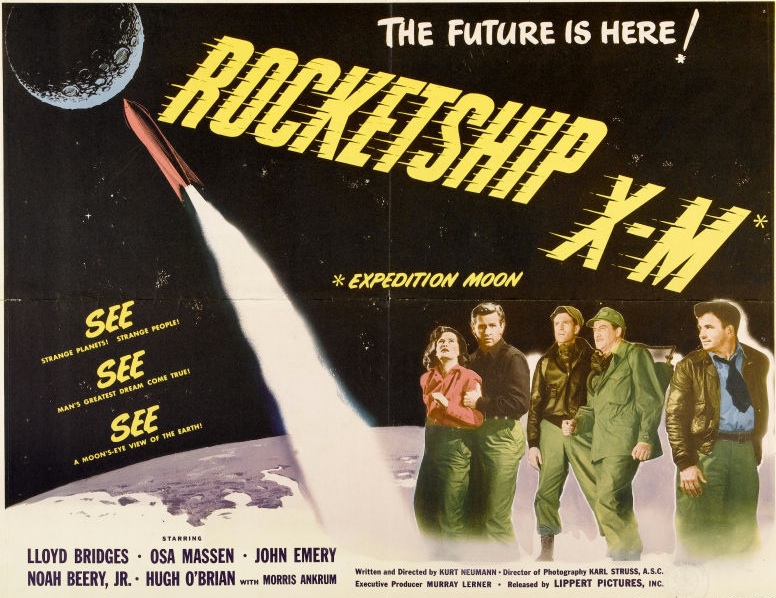
Lobby card.
For the first time, say the know-it-all web sites, a movie shows a multi-stage rocket. Indeed Dr Egghead, leader of the eXpedition to the Moon (hence X-M) explains this to the assembled media, who are sworn to secrecy. (These are the same hacks who a few years earlier published details about US depth charge tactics in the Pacific Ocean in newspapers. Guess what. The Japanese kept up their subscriptions and in turn changed their own tactics. Loose newsprint sank a good number of ships. The Newseum in D.C. strangely does not feature this episode in its trumpeting of the free press.)
That verisimilitude is quickly lost when the intrepid crew undergoes rigorous physical examinations fifteen minutes before launch. Blood pressure tests are administered: Readings are elevated as is to be expected. End of physical. They are also wearing buttoned collars and neckties like RAF pilots.
In addition to Egghead, there is Hotshot pilot, moody Stargazer, and Comic Relief. Wait, that is only four. Who is the fifth? The frail. A lady scientist. Egghead says her discoveries made the propulsion system of the rocket possible. Atta girl! However, thereafter she serves as the object of Hotshot’s lust, Egghead’s condescension, and Comic Relief’s efforts at humour. Star Gazer has eyes only for the stars. Though in one brief aside it seems her calculations of fuel use were right and Egghead’s were wrong. He is not big about it.
Off they go. Vroom! Things go wrong. That is what happens with the low bid contractors. They miss the Moon. Yes, They miss the Moon and find themselves Lost in Space, closer to Mars than anything else. They talk. The talk some more. [I left the room.] They are still talking. Finally they head for Mars and land. Well, why not. ‘M’ works for Mars, too.
Sidebar: They may have gone to Mars to avoid unpleasant comments about plagiarising the story ‘Destination Moon’ (1950). The same is said of ‘Flight to Mars’ (1950) by the know-it-alls.
On Mars the washed out rust coloured photography as they traipse around in mechanic’s coveralls and war surplus respirators is very striking. (It was filmed in the Mojave Desert.)
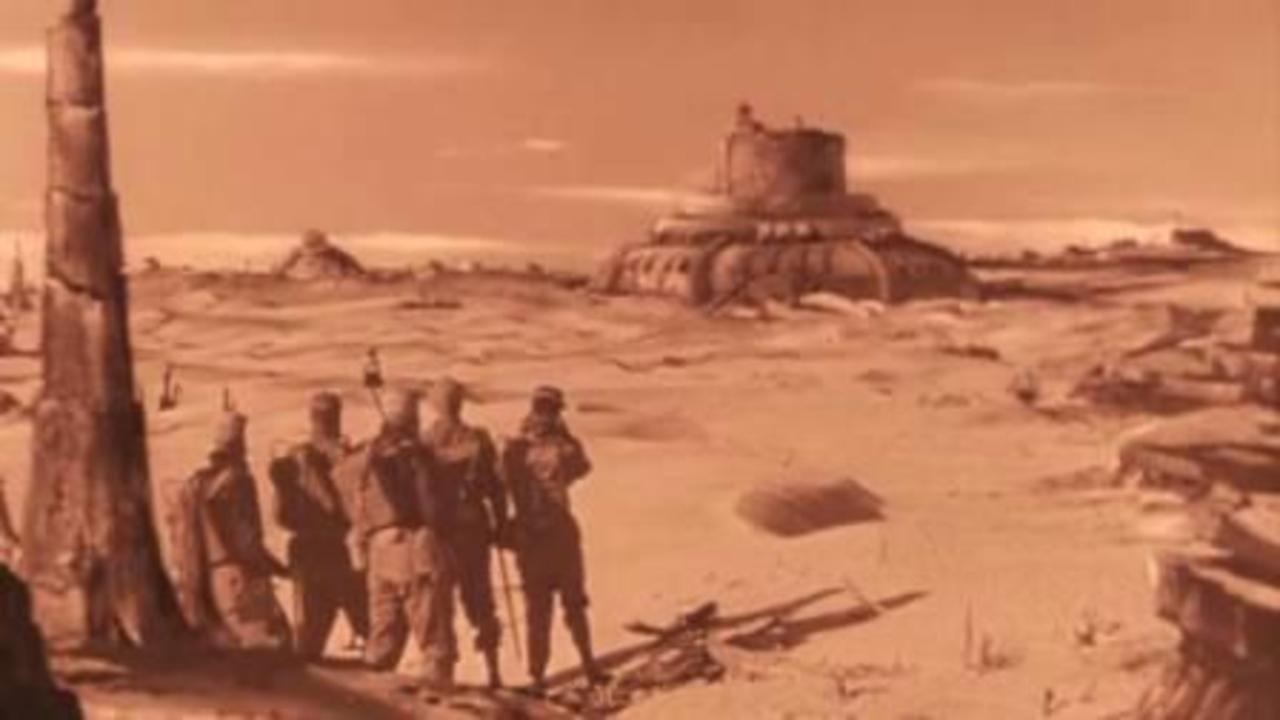
Red Mars.
The awe and wonder of the red planet comes across, accompanied by some muted theremin music, an essential for quality Sy Fy. More of the silent majesty of a new world would have been nice.
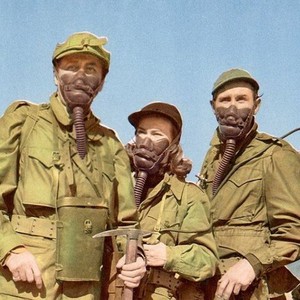
Note the gear for Martian exploration.
But by this time they are running out of B movie time, and ideas. Albeit, the direction does not feel rushed.
There is movement in the distance among the russet rocks. Natives. Martians who look like injured wrestlers from WWE, limping around with shaved heads, hairy backs, lantern jaws, tiny frontal lobes, big biceps, lots of scars and bruises. The crew stumbles on a sunbathing Martian woman, who does not look anything like something from WWE, and she sets off the alarm with a Hammer horror film scream. Wow! She is blind for reasons to be explained later. Read on.
The cavemen from WWE arrive bearing rocks and hurl them at the crew who conveniently remain within range below the cliff faces. Comic Relief goes first, as we knew he must. He was, by the way, Noah Beery, Junior, who was as ever charming and likeable, if tiresomely predictable. Egghead cracks next. Hmm, these are the best of the best the United States had, sent into space, and they are beaten and battered to death by cavemen. Maybe the physical should have been more rigorous.
The surviving crew shows surprisingly good sense in abandoning these fallen comrades and rush back to the ship and blast off. They have dragged along the square jawed Stargazer who also got clobbered, and is a burden. For some reason the two survivors did not consider lighting the load by jettisoning him. I did, maybe because he is the impossibly handsome Hugh O’Brian. That latter fact might explain both his retention as well as my suggestion to dump him.
Now the Lady Scientist and Hotshot alone together are rocketing back to Earth. She does more calculations with her slide-rule. This is one calculating gal. They have not the fuel for a controlled re-entry! She was indeed right about that as above. Crispy critters are on the menu. Gulp.
But first they have to warn Morris back in control of the dire fate that befell the Martians in the sure and certain hope it can be avoided. Huh?
It seems they made a lot of inferences from their two-minute first and last contact with the Martians, some radiation readings, and an fabricated icon in the red dust. Mars had an advanced civilisation (Exhibit A, the icon) that destroyed itself in a nuclear holocaust (Exhibit B, the geiger counter clicking) and has reverted to the mutant primitives they encountered (Exhibit C, hairy and blind) who walloped them. What other explanation could there be, Erich?
Is this a composition error? They met one blind woman and a few hairy-backs and have concluded all Martians are blind or hairy. Come to Newtown on a Saturday night and meet the local animal life and from that generalise to us all. Gosh, I hope not.
Hotshot and Lady Scientist in a broken transmission to Morris Ankrum back home pass the word: Don’t blow yourselves up! Message received. (Blow up others.) They then plunge to a fiery death while in a fiery embrace. Morris, like some surgeons, declares the operation a success though the careless patients died.
Oracle IMDB weighs at 4.9 opinioniums. That is below some of the effluvia of Adam Sandler.
But wait, there is a serious message buried in the melodrama as Hotshot and Lady Scientist clinch in the barbecue.
Atomic radiation is deadly, long-lasting, unavoidable, and even worse than Faux News. (Yes, that is possible.)
In many Sy Fy films of the era the official line of the US Atomic Energy Commission was followed according to which radiation was a minor nuisance. Wear gloves. Take aspirin. Say the Pledge of Allegiance. No problem. The films from this era are too numerous to list where atomic power is used like overproof diesel to power lawn mowers. It is no solace to know that the same thing happened in the Soviet Union, another example of convergence.
In the early 1950s concern about radiation in the United States was widely disparaged as a communist disinformation plot to inhibit the development of righteous American nuclear weapons and power. If a scientist published data about the ill effects of radiation, it was denounced as Red propaganda by the HUAC and Tail Gunner Joe. These were the climate change deniers of the day. Scientific evidence was dismissed toute suite! Alternative facts were manufactured.
In that context the screenplay’s emphasis on the evil of radiation was a show-stopper. In fact, the screenplay does have a moral within the Tom Swift adventure and the melodrama of the doomed lovers, and that is the evil of nuclear weapons. Subtle huh?
Not subtle enough because the screen writer fell to the HUAC lynch mob for his trouble and spent time in the slammer as a red incubus. That was the very talented and much accomplished Dalton Trumbo, who lives in my affection as the author of ‘The Happy Jack Fish Hatchery Letters.’ All of this cryptic to someone who wasn’t even born then: Tough.
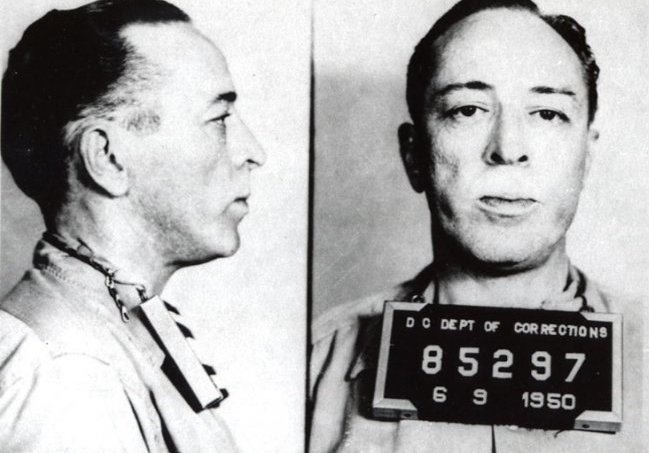
Dalton Trumbo on the way to the slammer.
By the way, 1950 was the very year the lynch mob turned on Robert Oppenheimer, whose leadership led to the atomic bomb, but who had many qualms about nuclear energy, nuclear power, and nuclear weapons. Red qualms said HUAC. What other explanation could there be, Erich?
Morris Ankrum must have had a deal according to which he had to be in in every Sy Fy pot boiler. My man-crush on him is explained in another post. Search for it and be enlightened.
Personal note. I did a brilliant grade school project on Atoms for Peace based on the Atomic Energy Commission’s publicity when I was a cute little boy. It set me on the way for the great career I had in Physics lab in college. Little did I know.
Second personal note. Learning to use a slide-rule was a major accomplishment and I still have it in my desk. (Though I have completely forgotten how to use it.)
‘Not of this Earth’ (1957)
Here is a set-up: A mysterious alien in a black business suit with a briefcase comes to Earth to subdue the Earthlings and harvest their blood. A boring Organisation Man, he carries in the briefcase a McKinsey Management Manual and uses it to condemn the hapless Terrans to endless meetings where the blood drains to the sitting position while they try to out-cliché each other with key performance indicators! Everyone’s job to manage something, but no one does anything. Get it? The aliens take over and no one notices.
Good, huh?! The idea is for sale. Every one has a price, and mine is cheap.
‘Not of this Earth’ is a Roger Corman production and surprisingly low key for this auteur. Paul Birch is the man from planet Davanna in a black suit with dark glasses and a stony expression who is lonely in a crowd. Well. no expression at all and a dry as dust delivery.

How does Birch collect blood? Well, don’t knock on his door and then follow him to the basement. Do not accept an invitation to dinner either. Glug, glug. The story is cryptic but it seems more than a dozen victims have littered the streets, unnoticed by the carrion of the press, each drained of blood. The word ‘vampire’ is mentioned once in connection with puncture wounds found on these victims. Ssssh.
That might sound like a big deal, what with a dozen dead young women lying about, but in the cop shop it is business as usual. Much sitting around eating donuts and complaining about the station coffee is done.
Birch does some analysis in the basement with the chem set from the brief case. Glug, glug. Looks like the Davanans can use human blood, so he opens the closest in his bedroom and teleports thirty cubits of blood to Davanna. (Yes, ‘cubits.’ To find out what the length of a forearm has to do with blood ask Roger Corman.) He also tries to teleport a living specimen, but this specimen arrives compressed. That is best left to the imagination. Bones was right not to trust beaming.
Birch himself is none too healthy and visits a doctor early in the going. With telepathy Birch exercises some mental control over the physician. To keep his strength up for blood-collecting Birch hires a nurse to live in his house and administer blood transfusions each night from some identified source of blood. She is Beverly Garland, who had a career in television with hundreds of credits. Can she handle this blood sucker!
Birch goes to libraries and bookstores to research humanity with special reference to matters sanguinary. He is socially inept and cannot drive a car. Odd for a man of his years in that time and place.
Then in a marvellous scene he passes a woman on the street and then stops to look in a shop window.
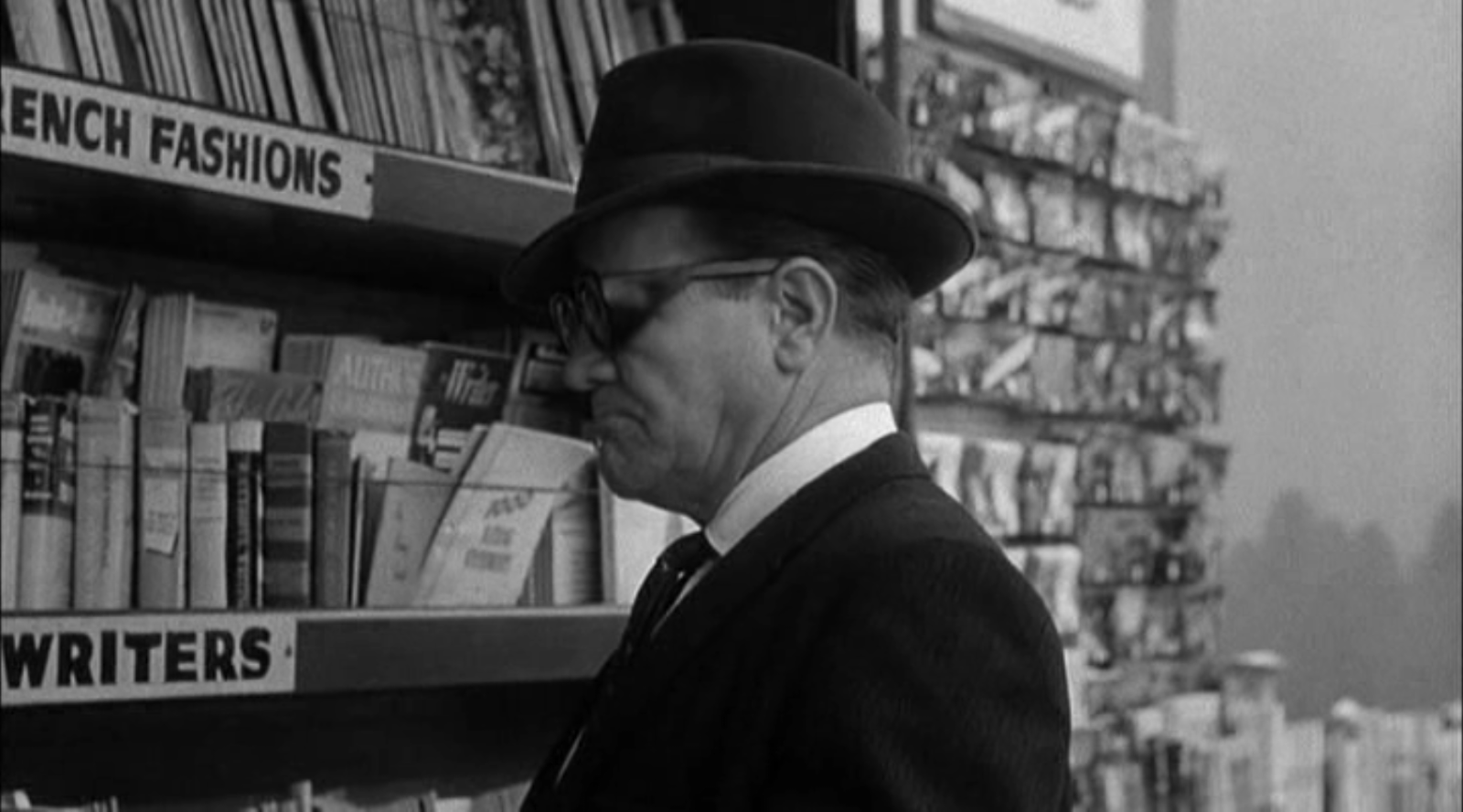
Alien window shopping for the latest Earth fashions.
She catches up with him and stops next to him, and they stare silently into the window, communicating by telepathy with voice overs. She, it turns out, is another Davannan whom he knows and she has come through the teleport in his closet, without asking permission, so desperate are things getting back home. Her account is cryptic. Some reviewers think she is describing a nuclear war on Davanna. I thought it sounded more like the destruction of a Republican Congress.
That is very like the enigmatic account in ‘Alphaville.’ Lemmy drove his Ford Galaxy across intersidereal space to Alphaville to talk the boss computer to death, while smoking forty a day. We are never quite sure why. Just seemed like the thing to do. Jim Kirk watched this as a lad and got his line in talking computers to death from it.
The situation on Davanna is desperate, and this Davannan woman herself is near death. This grim news and her perilous state drives Birch to act in haste (and repent at leisure). By now his cover is blown. The nurse knows something is up, and she no longer trusts the evasive doctor who seems to be part of it, so she rats them all out to the cops.
Birch realises she is onto him and asks her ever so politely and dryly to stand still while he dispatches her. Yikes! She does not comply.
Loved the scene when she calls the police with a perfectly clear demand for help, and let us remember all of those earlier victims, because the cops seem to have forgotten them, while the male officer on the phone dismisses her as an hysterical woman! So stupid, so annoying, so credible.
Birch has an Achilles ear and Beverly figures out how to deal with him. Stunned, weakened, confused, under a great deal of pressure, and an inexperienced driver, Birch rams his big Buick into a wall and dies.
The end! The end. The end?
Not quite. As the final credits roll, another man in a black suit with a brief case wearing dark glasses and a dead face strides across the grass toward the camera. Nice. Looks like Davanna has sent in Lemmy II.
The film opened with a scene before the credits, a rarity in 1957, in which the stone-faced Birch behind the dark glasses recites his collection of blood. Unusual and ominous.
The film is well paced, and low key. The music score matches the action, which is not always the case in this genre. The direction is deft and the pace is pacy.
Birch is sometimes called the poverty row John Wayne. He is perfect here, though he does not have the flat delivery the Duke could produce. Birch, too, had a long career in television. The rumour mill has it that Birch and Corman had a mighty argument about something, and Birch quit, leaving Corman to hire another actor to fill-in for him in distance shots. Since much the film takes place the dark, he is after all a vampire in all but fangs, who can tell.
When the doctor recovers his wits and tries to report to the police his conclusion that Birch is
‘Not of this Earth,’ Birch conjures a floating octopus that flies through the air and envelopes the doctor’s head like a feral lamp shade. The doctor is no longer of this Earth.
If Birch had flying octopi in reserve why did he not make more use of them? I would.
That creature is utterly gratuitous. Did the marketing department want a creature to feature on the posters and magazine advertisements, and did Corman oblige with this lamp shade which is but a sidebar. It may have also padded the movie when Birch quit or maybe he quit because of it.
On the IMDB is rates a respectable 6.4, though that puts it on the same level as the execrable Adam Sandler movies.
‘Destination Moon’ (1950)
A deuce documentary approach to the first flight to the moon, and back from producer George Pal, who went to great lengths, consulting Willy Ley, to get the science right, as it was then understood, and to get a major studio to release it for an A movie audience. He succeeded with the former but not the latter. The film was so eagerly anticipated that it spawned several quickies to ride the coattails of its publicity. e.g., ‘Flight to Mars’ (1950) and ‘Rocket X M’ (1950) and others.
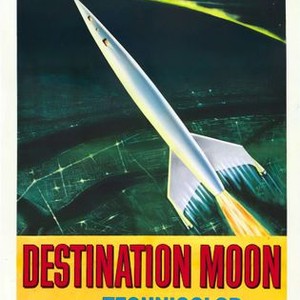
Lobby card
Space flight in 1950 was kid stuff, Buck Rogers, Captain Z-ro, Space Cadets, Flash Gordon, and Rocky Rocket, not for adults. The ‘New York Times’ reviewer, Bosley Crowther (1905-1981), agreed in a condescending, snide, and asinine review at the time. Crowther offered his own scientific advice, according to which space flight was i m p o s s i b l e. Period. He explained that the acceleration necessary to leave the Earth’s gravity could not be achieved. Never. Crowther also garbled the concept of ‘free orbit.’ No doubt he would be an Anti-Vaxxer climate denier today with that grasp of physics. Good thing he did not have to review ‘Fantasia’ (1940).
The film follows the preparation, launch, landing, and return of four astronauts from the United States in the hard Korean winter of the Cold War. The word ‘astronaut’ is not used, rather they are spacemen. There are obstacles aplenty. Test rockets that check out perfectly then fail on launch. How can that be? Sabotage by ‘them.’ Get it? The Reds left the beds and are now under the launch pads.
Indeed ‘they’ have infiltrated the government so that it cannot develop the moon missiles. Sounds like the party line from the House Un-American Activities Committee via the typewriter of Robert Heinlein whose story is the root of this film.
Yet it is imperative to get to the moon to prevent ‘them’ from getting there and using it as a missile platform. Something that ‘we’ would never do.
It is up to all those defence contractors to build the rocket. One of their number convenes a meeting and puts the proposal. Time to put up or shut up! After some hemming and hawing they agree. (As if!) A good thing, because if they did not, then no movie and no paycheque for Heinlein.

Woody explains space flight to the magnates.
Four aged men, none of them a pilot, one a general who evidently is free to roam the cosmos, two technicians who developed the engine, and the red shirt comic relief are the elite crew. In contrast to many other genre films of the time, there is no woman on board to be the butt of stupid remarks. In this outing the stupid remarks come from the comic relief. His naive and querulous remarks allow the three smartypantses to explain the science of moon flight to him. Also absent are tensions among the crew whose members work well together. Space flight is difficult enough, leaving no time for bickering and acrimony and that makes a refreshing change of clichés.
The gravitational force on takeoff, weightlessness, space sickness, free orbit, the starry cosmos. extra-vehicular activity are all there, and well done. The desolate moonscape is very nicely done, though the cracks on the studio floor imply it was once wet like a dry river bed. Hmm.
There are moments of drama during the EVA (see above, Mortimer). The landing is rough and consumes a great deal of fuel, compromising the return flight. Before facing that, the scientists in bright coloured, high visibility space suits claim the moon for the United States. oh, and all mankind. That’ll fix ‘them.’ ‘They’ would not dare set foot up there now!
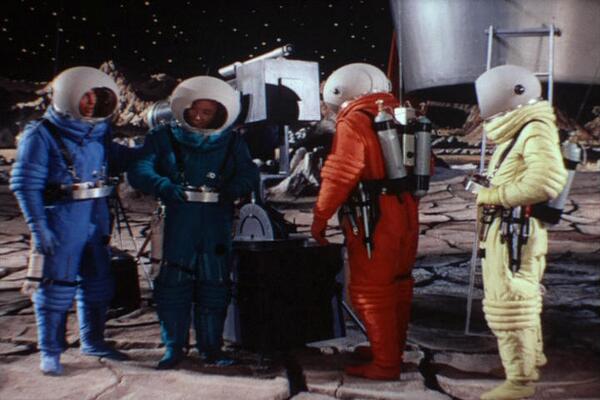
High visibility space suits, which were later re-used in other films. Check out the floor cracks.
At the approach of the launch window for the return flight the crew must shed weight from the ship. A lot. More. Yes, as predicted, though they rip out just about all the props there is still too much weight. By coincidence the excess weight matches that of the red shirt comic relief. Gulp!
The three big brains sit around trying to out noble each other by volunteering to stay behind for certain death. The industrialist, the AWOL general, and the engineer with the deep voice compete in declaring themselves useless. [Pause.] While they are listening to themselves, it’s a no-brainer and the comic relief jumps ship to sacrifice himself. ‘Good,’ I said, ‘no more stupid questions.’ But ‘we’ do not leave anyone behind (as ‘they’ would, is implied.)
But wait, at that moment the industrialist sees a way to shed more weight, and it is an ingenious idea, and can only work if the comic relief returns, which he does.
Whew! The four of them make it back to a return of heroes. A few bold individuals can do what the government cannot. Was this Ayn Rand’s favourite movie? ‘The End … of the beginning,’ says the closing title. Six years later Sputnik went beep beep in Bosley Crowther’s ear. George Pal was way ahead of the curve unlike the ‘New York Times’ reviewer whose mea culpa could not be found on the interweb.
Pal could not convince a major studio to make the film so he created a shelf-company and did it himself as an independent production. The can-do spirit of private enterprise did not apply to the big studios. He did negotiate release through Allied Artists.
